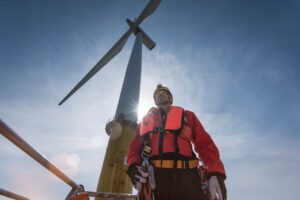On April 12, 2024, the EPA announced it issued the final Clean Air Act (CAA) Outer Continental Shelf (OCS) air quality permit for Dominion Energy’s Coastal Virginia Offshore Wind Commercial (CVOW-C) project, located off the coast of Virginia Beach, Virginia.
“Offshore wind energy is a cornerstone of the Permitting Council portfolio, representing nearly half of the projects currently receiving permitting assistance from our agency,” said Eric Beightel, Permitting Council executive director, in a Permitting Council news release. “These final approvals for the Coastal Virginia Offshore Wind project represent a significant milestone in our work, as it is the largest offshore wind energy project in U.S. history, helping to lead the way to a clean energy future nationwide.”
The permit authorizes the construction and operation of the largest offshore wind project in the United States, which will feature up to 176 wind turbines located 26 to 38 nautical miles from the coast. Once complete, the $9.8 million approved project will generate roughly 2,640 megawatts of renewable energy—enough to power 660,000 homes—and make significant contributions toward the Biden-Harris administration’s goal of generating 30 gigawatts of clean, abundant energy from offshore wind by 2030.
“To have the largest offshore wind project right here in the Mid-Atlantic is both a privilege and a responsibility—and we take our role in enabling clean energy initiatives very seriously,” said EPA Mid-Atlantic Regional Administrator Adam Ortiz in an Agency press release. “This project will generate enough renewable energy to power nearly five times as many homes as there are in Richmond—all done with the environment and communities front of mind.”
Expected to create 900 direct and indirect Virginia jobs annually during construction and 1,100 annual jobs upon completion, the project’s sponsors anticipate that it will avoid carbon dioxide emissions equivalent to removing more than 1 million cars from the road each year.
Upon completion, Dominion Energy said that “the wind farm’s output should generate fuel savings of $3 billion for customers in its first decade of operation,” according to AP News.
The permit includes requirements like the prevention of significant deterioration (PSD) permitting program and applicable Virginia Department of Environmental Quality requirements that regulate air pollutants from the construction and operation of the wind farm, including those from the vessels used to construct and support the project. The EPA coordinated its review of this permit in concert with other federal agencies, such as the Bureau of Ocean Energy Management.

